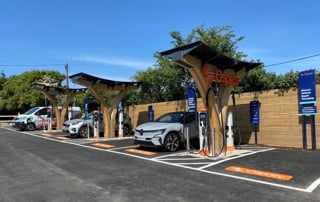Nissan has embarked on a project to design and develop the fuel station of the future in partnership with renowned international architects Foster and Partners.
The manufacturer says that the need for a sustainable and innovative refuelling network is becoming vital as the market shifts toward alternative sources like electric power.
Jean-Pierre Diernaz, director of EVs at Nissan, said: “Our current refuelling infrastructure model is out-dated and faces an uncertain future unless it rapidly adapts to support the changing needs of consumers.
“By 2020, there will be almost one million EVs on the road, so it is imperative that there is an infrastructure in place to support this growth.
“This initiative will take the first steps along that road to examine the wider transportation landscape and reimagine the future of mobility, preparing our cities for a more sustainable future.”
The concept will be based around a zero-emissions society, connected communities, autonomous drive and the Internet of things. It also aims to demonstrate the host of benefits brought by a smart EV ecosystem - not just in terms of mobility, but in harnessing the potential of battery storage and vehicle-to-grid systems.
Nissan will collaborate closely with Foster and Partners over the coming months to present its vision for the fuel station of the future later this year.
David Nelson, head of design at Foster and Partners, said: “The aim of our collaboration with Nissan is to highlight the magnitude of the challenge that we face in evolving our cities to meet change.
“New technologies, alternative forms of fuel and changing trends within our society are all having a huge impact on the way we get around.
“It seems to be clear that electric vehicles will be a major feature of the urban landscape and, as a result, this presents an exciting opportunity to rethink the fuel station for future generations; a new approach to design will create a more integrated and communal role within our towns and cities.
“As the leaders in the electric vehicle market, Nissan has been critical in providing insight on how the motorists of the future will interact with the built environment.”
The collaboration to conceive a new vision of the fuel station comes as the popularity of electric vehicles continues to increase. Sales of Nissan EVs in Europe rose by 33% in 2014 and continue to climb.






















Login to comment
Comments
No comments have been made yet.